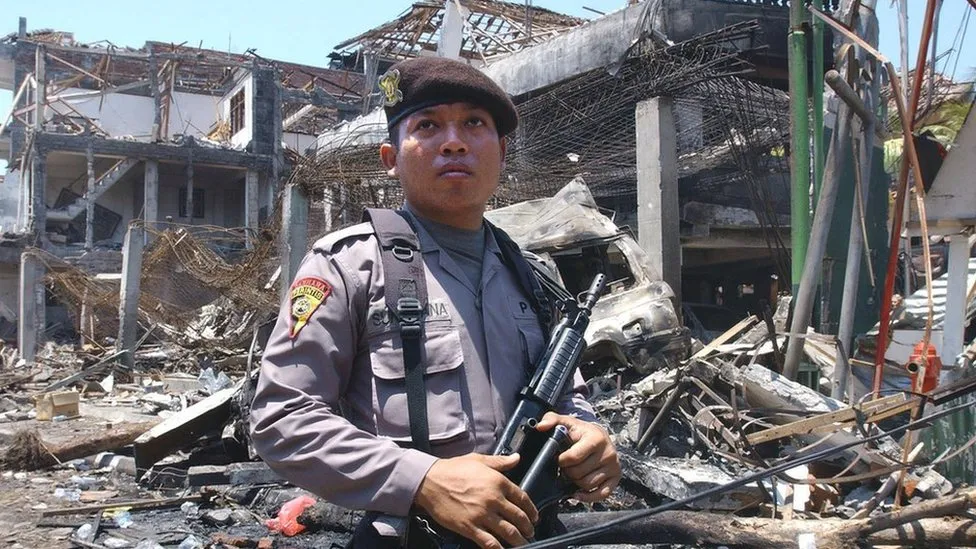Indonesian presidential hopeful Anies Baswedan has received backing from a firebrand cleric who was once the spiritual leader of an extremist group behind the 2002 Bali bombings, the country’s deadliest terrorist attack.
In an audio recording that went viral on social media in January, Abu Bakar Bashir, 85, described Jakarta’s former governor as the candidate who would “try to govern this country with Islamic laws as much as possible,” according to a report of Nikkei Asia.
The endorsement came just weeks before the world’s biggest majority-Muslim nation holds presidential elections. Anies, 54, is currently polling second behind frontrunner Prabowo Subianto, Indonesia’s defense minister. Elections are scheduled on February 14, when nearly 205 million people registered are expected to vote in Indonesia’s presidential and legislative polls.
While the cleric’s support may help Anies win some votes, official backing from Bashir and other hardline religious figures threatens to backfire on him in a country with tens of millions of moderate Muslim and non-Muslim voters, analysts said.
”Abu Bakar Bashir’s declaration will have a negative impact on Anies, as it strengthens society’s view that Anies is the father of identity politics who is supported by radical groups,” said Muhamad Taufiqurrohman, a senior researcher at the Center for Radicalism and Deradicalization Studies (PAKAR) in Jakarta, quoted by Nikkei. ”Bashir endorsed Anies, as he views him as the presidential candidate who is most likely to support the implementation of Shariah laws and the establishment of a caliphate in Indonesia.”
The archipelago of 274 million does not practice Sharia outside the conservative province of Aceh, where Islamic law is allowed under an autonomy deal that was struck with the central government to end a decades-long separatist insurgency.
Hardline groups, including Jemaah Islamiyah (JI), which Bashir co-founded, have for years launched deadly attacks, including against civilians, in their battle for a state ruled by Islamic law.
Bashir has denied involvement in the Bali attacks, which killed 202 people when bombs ripped through two nightclubs on the holiday island. His conviction on conspiracy charges over the Bali attacks was later overturned by Indonesia’s top court. In 2021, the octogenarian was freed after a decade in prison over his ties to a militant training camp in Aceh.
The Bali bombings were organized by the al-Qaida-linked group one year after Sepetember 11 attacks in the USA and were part of the worldwide terrrorist campaign of the Islamist network.
Bashir is not the only hardline figure to endorse the presidential candidate, who has also won backing from Abdul Somad, a firebrand preacher denied entry to Singapore in 2022 over what the city-state called his ”extremist and segregationist” teachings.
“A small yet significant voting bloc”
”The endorsement from hardline clerics … serve as a reminder for Indonesia’s non-Muslim community and moderate Muslims regarding what Anies did against Ahok in 2017, and would dissuade [them] from voting for him,” said Alexander Arifianto, senior fellow at the Singapore-based S. Rajaratnam School of International Studies (RSIS). Anies won Jakarta’s 2017 gubernatorial election by courting conservative voters and appearing at rallies with hardline Islamic leaders campaigning to oust his incumbent rival, Basuki “Ahok” Tjahaja Purnama, then the first Christian of Chinese descent to hold the city’s top job.
Anies also attended rallies staged by the 212 movement, named after the date Dec. 2, 2016 when Islamist group’s first demonstrated against Ahok.
The endorsement of Islamist preachers like Abdul Somad and the 212 movement will do more to capture the conservative vote than that of Bashir, who is a marginalized figure due to his extreme views on Islam, Arifianto said.
”Conservative Islamists number somewhere between 15% to 20% of all Indonesian voters, a small yet significant voting bloc,” he added.
Conservative Muslims alone are not numerous enough to hand victory to Anies, so he has also been courting votes from the moderate Nahdlatul Ulama (NU), Indonesia’s biggest Muslim organization, with about 90 million followers.
Anies and his running mate, Muhaimin Iskandar, an NU member and chairman of the National Awakening Party (PKB), are eyeing votes in NU stronghold province East Java, which has the country’s second-largest number of registered voters, at 31.4 million.
”He needs significant votes from NU, particularly in the battleground [areas],” Arifianto said. Anies ”has a competitive chance because he is backed by both Islamic hardliners and now by most NU clerics in East Java.”
According to a report of The Guardian, Anies Baswedan began to ponder the interplay between Islam and Indonesia in 2004, as a PhD student in political science at Northern Illinois University. In his paper, “Political Islam in Indonesia, present and future trajectory”, Anies pointed out that, “fertile ground exists for Islam-friendly political parties to attract considerable support from Muslim voters.” Muslim voters, he explains in the footnotes, referred to devout and practising adherents of the faith.
In 2017, his inauguration speech as governor of Jakarta drew criticism for stoking ethnic and religious tension. He said then that ”pribumi” (native or indigenous Indonesians) should take back control of the country from ”colonial” influences. The word ”pribumi” excludes ethnic groups like Chinese Indonesians or Indian Indonesians who have lived in the country for generations, according to Reuters. Anies Baswedan is himself a descendant of the Hadrami tribe of Yemen and comes from a family of respected moderate Islamic scholars. Indonesia’s 250 million people are predominantly Muslim, but it has sizeable Christian, Hindu and Buddhist minorities and hundreds of ethnic groups.
In December 2023, Jakarta prosecutors have confirmed the arrest of a key member in the campaign team of Anies Baswedan over accusations of tax fraud, according to Jakarta Globe. Nurindra Charismiadji, also known as Indra, was arrested Wednesday for alleged unpaid value-added taxes worth Rp 1.1 billion ($71,254) in 2019 and failing to produce his tax returns for two years, a senior prosecutor said.
Source link
